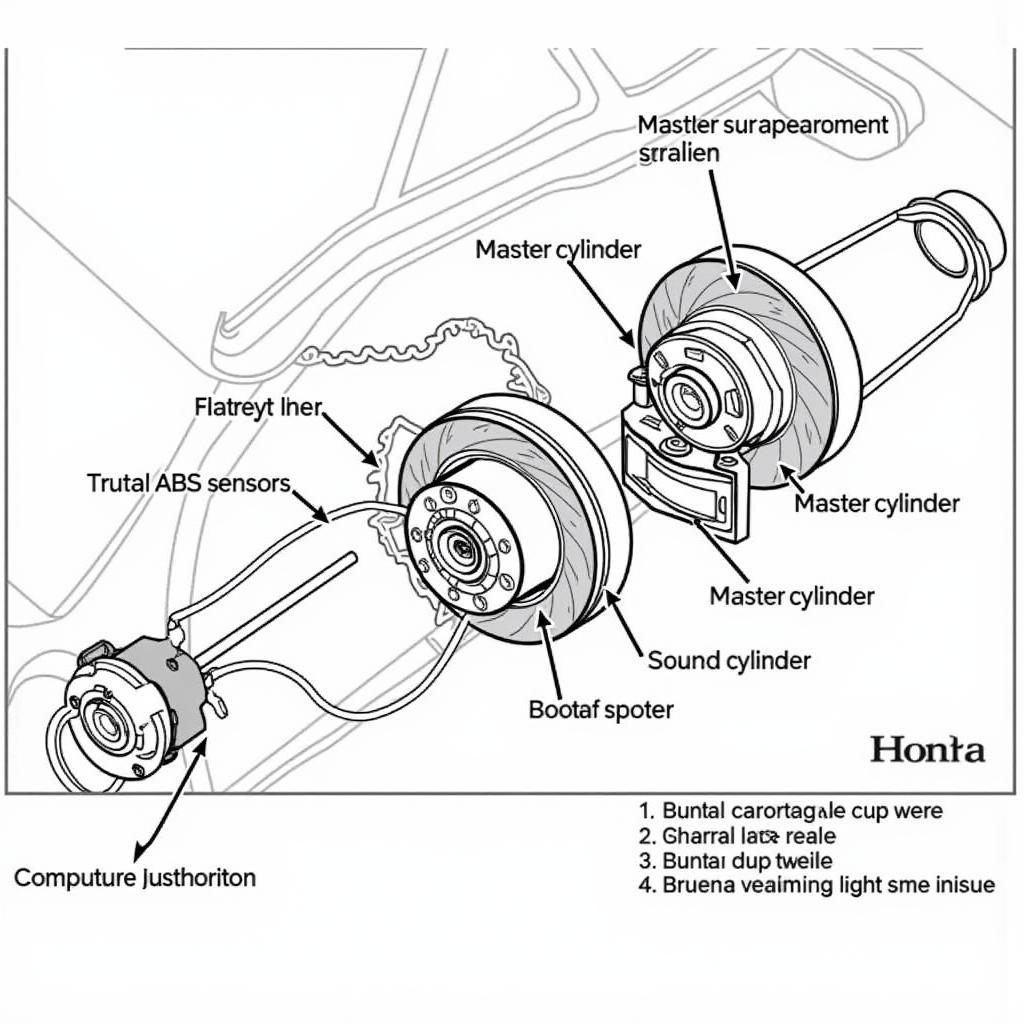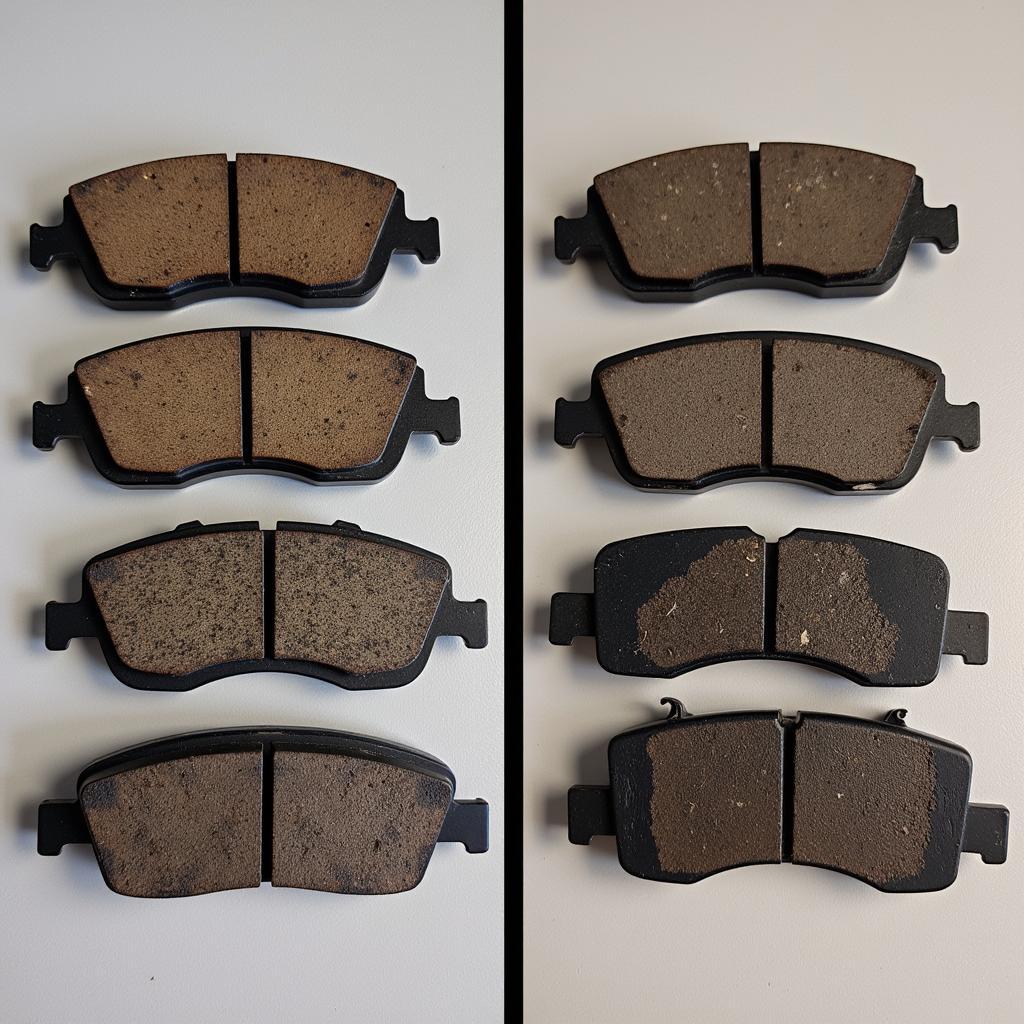If your Honda Civic’s brake warning light stubbornly refuses to turn off, it’s a clear sign that something needs your attention. This persistent light can indicate a range of issues, from a simple engaged parking brake to more complex problems like low brake fluid or worn brake pads. Understanding the potential causes and solutions is key to ensuring your safety and preventing further damage to your vehicle. 2001 honda civic brake warning light stays on
Common Reasons Why Your Honda Civic Brake Warning Light Stays On
Several factors can trigger the brake warning light in a Honda Civic. Let’s explore some of the most frequent culprits:
-
Engaged Parking Brake: This is often the simplest explanation. Double-check to ensure your parking brake is fully released.
-
Low Brake Fluid: Low brake fluid is a serious issue. It often indicates a leak in your brake system, requiring immediate attention.
-
Worn Brake Pads: As brake pads wear down, they trigger a sensor that illuminates the warning light.
-
Faulty Brake Light Switch: The brake light switch activates both your brake lights and the warning light. A malfunctioning switch can lead to a constantly illuminated warning light.
-
ABS Issues: Problems within the Anti-lock Braking System (ABS), such as a faulty sensor, can also trigger the warning light.
 Honda Civic Brake System Diagram
Honda Civic Brake System Diagram
Diagnosing the Problem: A Step-by-Step Guide
Identifying the exact cause of the honda civic brake warning light stays on requires a systematic approach:
-
Check the Parking Brake: The first and easiest step is to make sure the parking brake isn’t engaged.
-
Inspect Brake Fluid Level: Locate the brake fluid reservoir under the hood and check the fluid level. If it’s low, add brake fluid and check for leaks. foot parking brake warning light switch
-
Examine Brake Pads: Visually inspect your brake pads for wear. If they appear thin or worn, they likely need replacement.
-
Test Brake Light Switch: The brake light switch is located above the brake pedal. Test its functionality by pressing the brake pedal – your brake lights should illuminate. If not, the switch may be faulty.
-
Scan for ABS Codes: If the above steps don’t reveal the issue, a diagnostic scanner can be used to read any stored ABS trouble codes.
How to Fix a Honda Civic Brake Warning Light That Stays On
The solution depends on the diagnosed problem:
-
Top up Brake Fluid: If the fluid level is low, add brake fluid to the recommended level. If the issue persists, you likely have a leak that needs professional attention.
-
Replace Brake Pads: Worn brake pads should be replaced immediately to ensure safe braking performance.
-
Replace Brake Light Switch: A faulty brake light switch is a relatively inexpensive and easy part to replace.
-
Address ABS Issues: ABS problems often require specialized diagnostic equipment and expertise. It’s best to consult a qualified mechanic.
dashboard warning lights brake
When to Seek Professional Help
While some issues can be addressed with basic DIY skills, more complex problems, especially those related to the ABS, require professional assistance. Don’t hesitate to contact a qualified mechanic if:
- You suspect a brake fluid leak.
- You’re uncomfortable working on your brake system.
- You’ve tried the basic troubleshooting steps and the light remains on.
- The warning light is accompanied by other symptoms, such as unusual noises or vibrations.
“Ignoring a persistent brake warning light can lead to significant safety hazards and costly repairs down the road,” advises John Smith, ASE Certified Master Technician. “Addressing the issue promptly is crucial for maintaining the integrity of your braking system.”
Conclusion
A honda civic brake warning light stays on is a signal you shouldn’t ignore. By understanding the common causes and following the troubleshooting steps outlined above, you can often pinpoint the problem and take appropriate action. However, always remember that your brakes are critical for your safety. When in doubt, consult a qualified mechanic. Don’t risk your safety – address the issue promptly. honda civic brake pad warning light
FAQ
-
What does the Honda Civic brake warning light mean? It signals a potential problem with your braking system, such as low brake fluid, worn brake pads, or issues with the ABS.
-
Is it safe to drive with the brake warning light on? While you might still be able to brake, driving with the light on is risky. It’s best to diagnose and fix the problem immediately.
-
How much does it cost to fix a Honda Civic brake warning light issue? The cost depends on the underlying cause. A simple fix like topping up brake fluid is inexpensive, whereas more complex repairs like replacing the ABS module can be more costly.
-
Can I fix the brake warning light myself? Some fixes, like topping up brake fluid or replacing brake pads, can be done by DIYers. However, more complex issues require professional expertise.
-
How can I prevent the brake warning light from coming on? Regular maintenance, including brake inspections and fluid changes, can help prevent many brake-related issues.
-
What if the light stays on even after I’ve checked the parking brake? Further investigation is needed. Check the brake fluid level, inspect the brake pads, and consider having a mechanic diagnose the problem.
-
My brake pedal feels spongy. Is this related to the warning light? A spongy brake pedal can indicate air in the brake lines, a leaking master cylinder, or other problems. It’s often related to the warning light and requires immediate attention.

